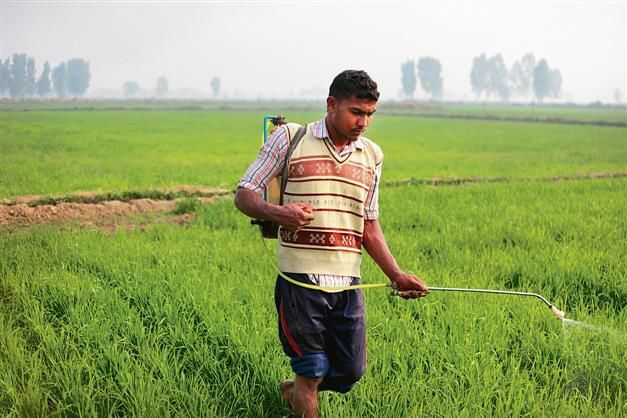
Neeraj Mohan
New Delhi, July 26
Punjab, India's leading agrarian state, has emerged as the top consumer of fertilisers, comprising nutrients such as nitrogen, phosphate and potash. It is also the third largest consumer of chemical pesticides in the country, according to the latest data from the Ministry of Agriculture and Farmers Welfare.

Promoting crop diversification
- The state government has taken several measures to promote crop diversification, aiming to reduce its dependency on wheat and paddy, which are primary consumers of fertilisers
- These efforts are intended to create a sustainable agricultural system in Punjab. However, the state's adoption of bio-pesticides remains low, with Punjab ranking 11th in the country
The data, shared by Union Agriculture and Farmers Welfare Minister Shivraj Chouhan, highlights that Punjab's wheat and paddy growing districts are the primary consumers of these inputs. In 2022-23, 15 districts in the state reported an average fertiliser consumption of 254.39 kg per hectare. The state's average consumption of around 223 kg per hectare is significantly higher than the national average of 90 kg per hectare.
Responding to a question by MP Satnam Singh Sandhu, Chouhan explained: "According to the Punjab Government, the per hectare consumption of fertilisers is on the higher side due to very high cropping intensity and the cultivation of rice and wheat, which are high-demand fertilizer crops."
Punjab's total gross cropped area stands at 78.71 lakh hectares, of which around 7,000 hectares are now under certified organic farming. The production of organic fertiliders has also seen a substantial increase, rising to 7,407 metric tonnes (MT) in 2022-23 from 473 MT in 2021-22, indicating a growing shift towards organic farming practices in the state.
In another response, the minister informed the Rajya Sabha that the total consumption of chemical pesticides in Punjab reached 5,270 MT in 2023-24 (66 kg per hectare), up from 5,130 MT in 2022-23. This makes Punjab the third highest consumer of chemical pesticides in the country, following Uttar Pradesh (11,828 MT) and Maharashtra (8,718 MT), which have significantly larger cultivated areas of 2.41 crore hectares and 2.05 crore hectares, respectively. Punjab's pesticide consumption accounts for 9.52% of the national total.
However, the state's adoption of bio-pesticides remains low, with Punjab ranking 11th in the country, consuming only 193 MT annually. Data from the Ministry of Chemicals and Fertilisers also shows a consistent rise in the consumption of key fertilisers such as urea and NPK in Punjab.
In 2022-23, the state's urea requirement increased to 29.25 lakh MT from 28.30 lakh MT in 2020-21, and NPK demand surged to 1.70 lakh MT from 0.76 lakh MT during the same period. Conversely, the demand for DAP (diammonium phosphate) declined to 7.25 lakh MT from 8.25 lakh MT.
Minister Chouhan mentioned the implementation of the Galvanising Organic Bio-Resources Dhan (GOBARdhan) scheme, launched in 2018, which aims to convert organic and biodegradable waste, including cattle dung and crop residue, into bio-gas and fermented organic manure (FOM). The scheme offers financial assistance of up to Rs 50 lakh per district for the entire programme duration.